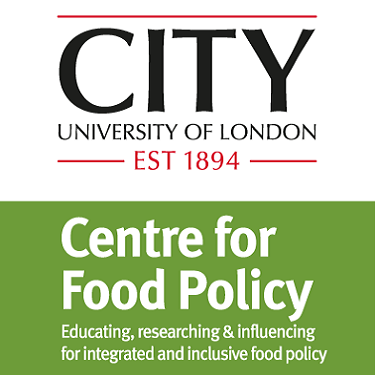About The Centre for Food Policy
Food policy matters because it affects everyone. Food policy shapes who eats what, why and at what cost. It affects our nutrition and health, our livelihoods and communities, our cities and countryside, our nature and climate — now and for future generations. Food policy also affects the people whose jobs involve growing, moving, processing and selling food.
Through food policy we have an opportunity to rise to the challenge of improving nutrition and health, protecting the planet and contributing to economic and social prosperity, equitably.
The vision of the Centre for Food Policy is a world where food policy is improving the wellbeing of people and planet, everywhere.
What is food policy?
“Food policy” comprises the policies that influence and shape the food system — everything and everybody involved in producing, storing, packing, processing, distributing, consuming and disposing of food.
Integrated food policies take account of the interconnections in the food system to enable nutrition/health, environmental, social and economic goals to be delivered more coherently. Inclusive food policies take account of people’s voices and experiences across the food system to enable goals to be delivered more effectively and equitably.
Our purpose and goals
The Centre for Food Policy works to advance integrated and inclusive food policies that work for everyone.
We look at food policy through an inter-disciplinary, food systems lens that brings together different problems, sectors and institutions, and issues from agriculture to nutrition, labour to public health, politics to economics, cooking to culture. We join the dots from farm to fork, boat to throat, gate to plate.
We pioneered this integrated approach when we were founded in 1994. Our approach has now moved from marginal to mainstream. For example, our work on the multiple policy influences on obesity stimulated a more systems-based approach by governments; our work on “sustainable diets” shaped the international definition and created space for debate on the tensions and opportunities linking environment and health goals.
Now, our goal is to advance the delivery of this approach, locally, nationally and internationally. It is also to explore how food policy can become more inclusive by listening to, engaging with and involving people. Evidence shows that opportunities to improve food policy are being missed by failing to reach out to unheard voices and translate what is learned for more people-centred design.
What we offer
Independent, inter-disciplinary food policy analysis and research.
We conduct inter-disciplinary research that explores how integrated solutions can be put into practice by policymakers and civil society. For example, we lead the policy component of a major Wellcome Trust-funded Our Planet Our Health project in India and South Africa. We are working with the World Health Organization to advance the theory and practice of “double duty actions” that take a more integrated approach to addressing malnutrition in all its forms.
We offer technical assistance, consultancy and advice to local and national governments and international agencies. In the UK we are members of the London Food Board and are supporting the development of the Good Food Nation Bill in Scotland, both of which aim to address a range of different food challenges.
Our history of engagement with civil society is reflected in our Food Research Collaboration, an initiative funded by the Esmée Fairbairn Foundation to advance collaboration between academics and civil society.
We bring to these collaborations the skills of food policy analysis. We explore policy disconnects, map where policy exists, where it is absent, how coherent (or incoherent) it is and what can be learned from it. We monitor policy development, analyse the politics of policy processes and explore who is influencing decision-making and how — the governance of food policy. For example, the Food Research Collaboration is mapping the policies and governance affected by the withdrawal of the UK from the European Union.
We are committed to listening and learning from people across the food system. Our work on food insecurity is based on understanding people’s experiences. Our PhD students are examining how people experience policies on obesity, healthy eating and farming. Our work on sugar engages with the people throughout the supply chain.
We provide forums for discussion. Our Food Thinkers series features speakers concerned with the possibilities and challenges of integrated food policy. Our annual City Food Symposium, funded by the Worshipful Company of Cooks, advances the thinking and practice of inclusive food policy.
Education for current and future food policy decision-makers and influencers in governments, public institutions, civil society and business
Our unique Masters in Food Policy equips students with the skills needed to advance more integrated and inclusive policy. It offers part-time and distance learning options to ensure those working professionally in the field can participate. Our alumni work in governments, international agencies, civil society, social enterprises, media and big companies, run their own businesses and undertake further study.
We co-manage the Innovative Food Systems Teaching and Learning (IFSTAL) initiative with four other universities, an education programme building a broad front of inter-disciplinary professionals equipped with food-systems thinking for the workplace. IFSTAL increases employability skills and gives students access to people working across the food system.
Our PhD programme has a cohort of students studying a diversity of food policy topics and actively engaged in the life of the Centre. It offers early- and mid-career professionals the opportunity to situate detailed research within the bigger picture and engage with live policy issues.
What’s next
Our plans include:
- Preparing guides on the mechanics of integrated food policy
- Building a flagship “listening and learning” programme
- Engaging more proactively to offer technical assistance at the international scale
- Building a scholarship programme for our Masters
- Developing short courses
- Defining the methodological approaches of progressive food policy analysis.
Keep up to date with us @FoodPolicyCity .


